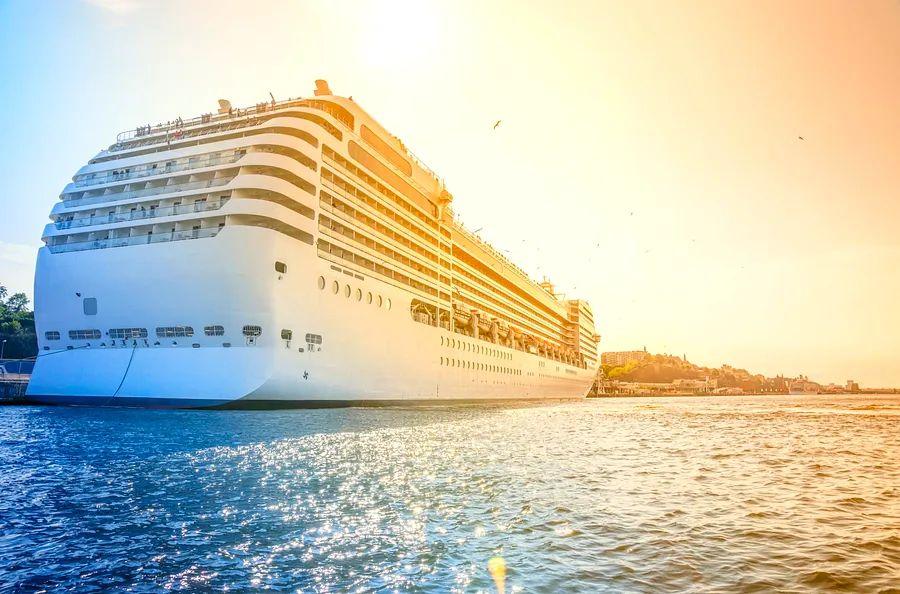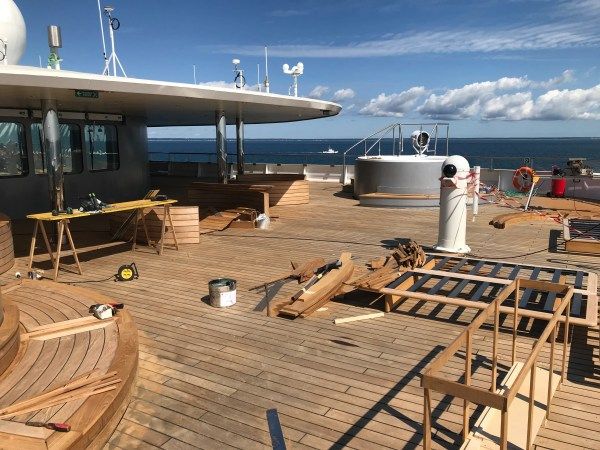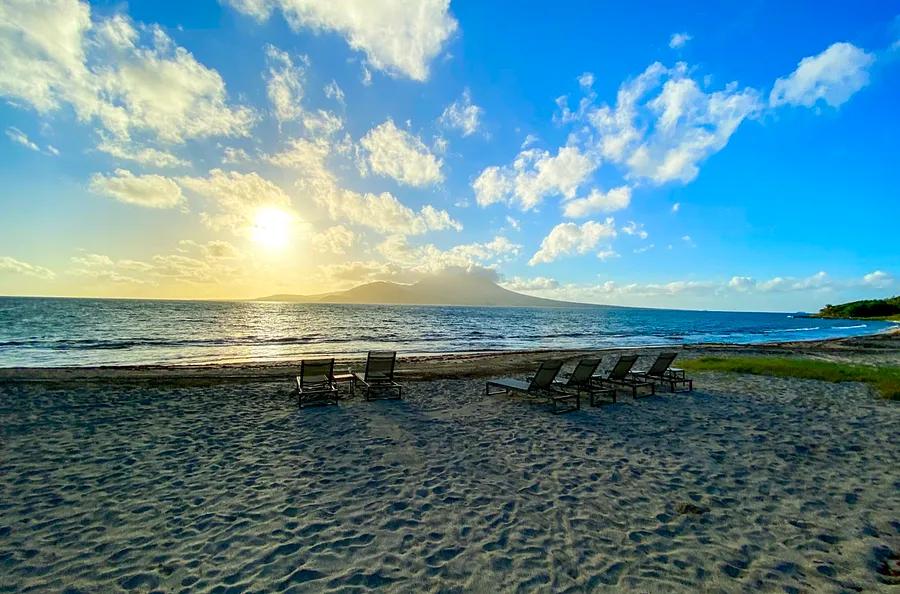5 reasons to think twice before booking a new cruise ship

There’s a unique excitement that comes with being on the inaugural voyage of a new cruise ship. The crew is buzzing with enthusiasm, passengers are thrilled, and the atmosphere is often festive, complete with extravagant touches like fireworks and lively deck parties featuring abundant Champagne. Plus, you might even catch a glimpse of a celebrity or two — or at least the cruise line's top executives.
For dedicated cruise enthusiasts, this experience can also provide unmatched bragging rights for years to come.
However, booking a maiden voyage (or the initial sailings of a brand-new ship) does come with its own set of risks. Cruise ships function like floating hotels, and, similar to hotels, they may not be fully prepared for guests when they first set sail.
At times, they may be completely unprepared, as early bookers of the first ship from Explora Journeys discovered in July 2023. The new luxury line had to cancel the inaugural voyage of the 922-passenger Explora 1 due to a last-minute construction issue. The shipyard needed to make a final adjustment before the vessel could embark.
Before you commit to an early sailing on the next popular new ship, consider these important factors.
Your sailing could be canceled
Fortunately, shipyard delays like those that postponed the debut of Explora 1 (initially set for July 17, now delayed until at least August 1) are fairly uncommon. The latest new ship from MSC Cruises, MSC Euribia, launched from the Chantiers de l'Atlantique shipyard in St. Nazaire, France, right on schedule in June. New ships from Silversea Cruises and Norwegian Cruise Line slated for August also seem likely to arrive as planned.
That said, delays do occur, and they’ve become more frequent in recent years, largely due to supply chain disruptions stemming from the COVID-19 pandemic that set many shipyards back in their construction timelines. A notable example is the 33-month delay in the launch of The Ritz-Carlton Yacht Collection's first ship, Evrima, which was originally set to debut in February 2020 but faced eight delays, with its first sailing not occurring until October 2022.
 The launch of The Ritz-Carlton Yacht Collection's Evrima was pushed back by 33 months. RITZ-CARLTON
The launch of The Ritz-Carlton Yacht Collection's Evrima was pushed back by 33 months. RITZ-CARLTONThe delay of the Evrima was caused by more than just issues related to the pandemic's impact on the supply chain. Significant challenges at the shipyard where the vessel was initially built also contributed to the holdup.
Hurtigruten's Roald Amundsen, an innovative expedition-style ship, also faced considerable delays in recent years. This vessel, engineered to run on battery power for brief durations in delicate Arctic and Antarctic regions, finally set sail in 2019.
Often, it's these pioneering "prototype" vessels that encounter problems during their construction—something to consider if you're contemplating booking a ship that's marketed as particularly innovative. This issue appears to occur more frequently with ships from new players in the cruising sector, like Explora Journeys and The Ritz-Carlton Yacht Collection.
However, this isn't exclusively a problem for the major cruise lines. In 2016, Holland America delayed the introduction of its new ship, Koningsdam, by six weeks to implement last-minute design alterations.
If a cruise is canceled, rescheduling can be quite challenging.
If you happen to be on an early sailing of a ship that gets canceled due to shipyard delays, you will typically receive a full refund along with some form of compensation as an apology. For instance, passengers on the recently delayed Explora 1 were offered not only a complete refund but also a credit for a future cruise in its maiden voyage cancellation.
That certainly seems generous. However, utilizing future cruise credits can be tricky. Securing a spot on a later sailing that fits your schedule, especially if you prefer a similar itinerary and cabin type, can often prove challenging. This is especially true for a newer line like Explora Journeys, which currently operates just one relatively small ship with limited inventory.
Not everything will function perfectly.
It's quite common for some cruise lines to take possession of a ship on a Thursday and have it ready for revenue service by Friday. Other lines may schedule a few days for a non-revenue "shakedown cruise" with employees and invited guests—essentially a test run to iron out any issues before actual passengers board. Regardless, you shouldn't expect everything to operate flawlessly during the initial sailings of a new vessel.
Often, restaurants can feel a bit chaotic on early sailings as the kitchen and serving staff acclimate to their new environment. Additionally, performances in the showrooms may seem somewhat off. While the cast of major productions will rehearse extensively on land before boarding a new ship, they need some time to find their rhythm. For example, when Royal Caribbean's Wonder of the Seas launched in 2022, it didn’t even present full performances of two of its flagship shows, the AquaTheater's "inTENse" and the mainstage's "The Effectors II."
Moreover, every ship leaves the shipyard with a checklist of hundreds or even thousands of minor issues that need attention. As a seasoned cruise writer, I've experienced numerous maiden voyages, encountering problems ranging from malfunctioning cabin phones and TVs to sinks with reversed hot and cold water pipes.
You might also discover that technology-related features, like onboard internet, are still undergoing adjustments. The same goes for ship provisioning. On two recent early sailings of new ships, I noticed that the onboard sushi bar ran out of edamame midway through the cruise. While it's not catastrophic, it illustrates the type of minor mishaps that can occur on new vessels.
The silver lining is that modern passenger ships generally do not require a "breaking in" phase to address stability issues as they did in the past. Ship historians often recount stories of unstable early 20th-century ships, such as Germany's 1913-built SS Imperator, which carried so much heavy marble that it rolled violently in rough waters. Eventually, the marble was removed to improve stability.
Thanks to advancements in computer-assisted design and stabilization technology, contemporary ships typically avoid such problems. (Rest assured, there have been extensive sea trials conducted for your ship before any passengers come aboard.)
Nonetheless, new ships often have a few shipyard workers onboard during the initial days or weeks to address the punch list. On a positive note, most issues are resolved swiftly.
Some venues may not be operational.
 The primary outdoor lounge area on the 228-passenger Scenic Eclipse continued to be under construction for several weeks after its launch in 2019. GENE SLOAN/Dinogo
The primary outdoor lounge area on the 228-passenger Scenic Eclipse continued to be under construction for several weeks after its launch in 2019. GENE SLOAN/DinogoAt times, the punch list includes significant items—like entire sections of the ship that are incomplete.
When I sailed on Scenic Luxury Cruises' new Scenic Eclipse in 2019—over two weeks after the first paying guests had boarded—the main outdoor lounge was still being finalized. The casual buffet, the Yacht Club, had just opened the day before my arrival, and the main pool was not yet operational. This was after the ship's debut had already been postponed by a year due to construction delays. Even after a full year of setbacks, the vessel was still not completely ready when it finally began its journeys.
In contrast, the new Princess Cruises ship, Sky Princess, which launched just a few weeks after Scenic Eclipse, appeared more complete than any new ship I've encountered during a preview of its maiden voyage. However, even Sky Princess had one area—a top-deck escape room named Phantom Bridge—that wasn't finished, with construction continuing for a couple more months.
Some crew members are still in the learning phase.
The largest cruise lines typically have a core team of managers and staff who oversee the launch of each new vessel, leveraging their expertise to ensure a smoother startup. At various brands, including Norwegian Cruise Line and Viking, I often spot the same bartenders, restaurant servers, and room stewards at the launch of every new ship as they transition from one vessel to another.
Nonetheless, even the most seasoned crew will face a learning curve with a new ship, especially if it's a unique prototype where restaurants, bars, lounges, and other service areas are not located in the same positions as they were on previous ships. Service can sometimes be inconsistent while they acclimate.
 Carnival crew members were busy mixing drinks in May during the maiden voyage of Carnival Venezia. GENE SLOAN/Dinogo
Carnival crew members were busy mixing drinks in May during the maiden voyage of Carnival Venezia. GENE SLOAN/DinogoFrom my observations, service issues tend to be most apparent on new ships operated by smaller or startup lines that lack a substantial fleet of established vessels to draw experienced staff from.
On a positive note, cruise lines sometimes intentionally limit the number of passengers on the initial sailings of a new ship to ease the crew into their roles. This can result in more available space around the pool deck and easier access to seating at shows on a newly launched vessel.
Here are a few tips if you decide to book a new ship.
Despite everything mentioned, I completely understand if you're eager to book one of the early sailings of a new vessel. I personally relish the experience of being on the maiden voyage of a new ship, even if it’s not entirely perfect. My travel list boasts inaugural trips on legendary ships like Cunard's Queen Mary 2 and Royal Caribbean's Oasis of the Seas. When I reflect on those journeys, I don’t dwell on the minor mishaps in the dining room; instead, I cherish the unique experience they offered.
Embarking on a maiden voyage, or even an early sailing of a new ship, presents a unique opportunity to witness cruising history being made firsthand.
That said, before committing to an early sailing on a new ship, there are a few strategies you can employ to reduce the likelihood of disappointment:
To begin with, avoid linking the cruise to a larger trip involving numerous other travel arrangements such as hotels, airlines, tours, car services, and private guides. This way, if the cruise gets canceled at the last minute, you won’t find yourself in a frenzy trying to untangle all the other aspects of your trip.
You should also aim to arrange your flights to the ship in a manner that allows for quick changes. As a longtime United Premier 1K flyer, I often book tickets for maiden voyages using miles that can be canceled on short notice without any penalties if issues arise.
If you don’t have access to such perks, consider booking your flights directly through the cruise line. This way, if the cruise is canceled, dealing with flight cancellations and refunds falls on them, not you. However, I typically advise against booking flights through cruise lines, as their air departments are notorious for offering suboptimal routes and frequently use bulk tickets that are difficult to upgrade. Additionally, these tickets often don’t earn points for elite status, such as United premier qualifying points or American elite qualifying dollars.
Furthermore, if you decide to book an early sailing of a new ship, it’s wise to have at least a tentative plan B in mind. While cancellations of early voyages are relatively uncommon these days, don’t stress too much about it. Just be aware that there’s a small chance you might need to find a last-minute alternative destination for those vacation days that your boss has already approved.
Ultimately, it’s important to manage your expectations for an early sailing on a new ship. As mentioned earlier, not every venue may be fully operational or even open. If you’re particularly eager to experience a specific headline show or a much-anticipated attraction, you might find yourself let down if it’s not ready for guests yet.

1

2

3

4

5
Evaluation :
5/5